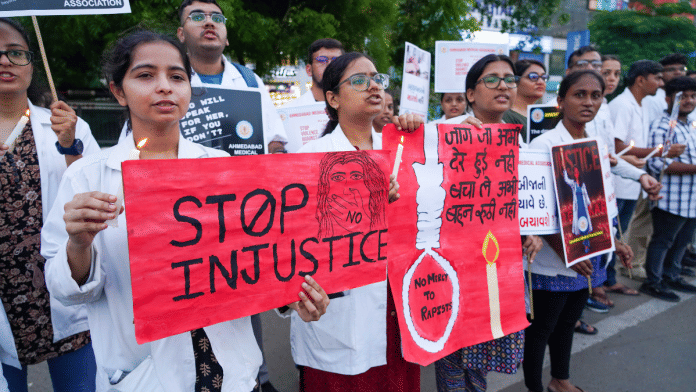Thank you dear subscribers, we are overwhelmed with your response.
Your Turn is a unique section from ThePrint featuring points of view from its subscribers. If you are a subscriber, have a point of view, please send it to us. If not, do subscribe here: https://theprint.in/subscribe/
The brutal rape and murder of a young doctor at RG Kar Medical College in Kolkata, followed by the state government’s attempts to cover up the crime, have sparked a wave of outrage that has rippled across West Bengal and garnered attention beyond Bengal’s borders. What began as a protest by junior doctors has rapidly transformed into a mass movement, a clarion call from citizens worn down by systemic corruption. This uprising transcends a single tragedy—it has become a rallying cry to dismantle the entrenched impunity that has plagued the state for decades.
The forced resignations of senior police and health officials, along with the dramatic arrests of high-ranking figures such as the Officer-in-Charge of a police station and the Principal of RG Kar Medical College, signal a pivotal moment in this struggle. These actions are far from mere symbolic gestures. They are the first visible cracks in the armor of a bureaucratic system that has long been immune to accountability. For years, West Bengal has been mired in bureaucratic inertia, with politicians and officials shielding one another from responsibility. Today, an unstoppable shift is underway. Kolkata, the city that was once India’s intellectual and cultural beacon, is witnessing the awakening of its fierce legacy. The junior doctors leading this charge are heirs to Bengal’s progressive intellectualism and proud tradition of activism that once propelled India toward independence. Their protest is not just about one tragic death. It reflects the very soul of this city.
This movement is not merely a protest, it is the reclamation of West Bengal’s identity. It represents a collective act of renewal, a resolute rejection of the status quo that has been built on decades of political opportunism and corruption. The resilience of the people shines as they demand justice, accountability, and an end to decades of exploitation. In many ways, this uprising mirrors the early days of India’s independence struggle, when the fight was not just against colonial rule but against all forms of oppression and injustice.
Today’s protesters, like the revolutionaries of the past, are driven by an unshakable sense of moral outrage. They seek not only justice for the young doctor but also the liberation of West Bengal from the suffocating grip of corruption. This movement, like the independence struggle, is rooted in moral indignation and an unyielding demand for change. It is not just a display of defiance but a reawakening of the revolutionary spirit, pushing for a complete transformation of the state’s political and social fabric.
Historically, Kolkata’s protests have often been intertwined with political agendas, from the tram fare strikes of 1953 to the Nandigram uprising in 2007. But the RG Kar movement commands its own gravity, driven by the people themselves, free from political manipulation. It resembles revolts like Occupy Wall Street and the Arab Spring—movements sparked by ordinary citizens demanding systemic reform. This is not just a call for justice; this movement is about more than just one tragedy; it is a reckoning with decades of decay and the erosion of public trust.
As the public outcry continues to grow, it is becoming clear that this movement is about far more than retribution. It is about dismantling the very architecture of a broken system. It is aimed at annihilating the entire corrupt apparatus. The movement’s message is unequivocal: the era of corruption is over, and it is time for a reckoning.
This uprising has drawn global attention, drawing comparisons to movements like Hong Kong’s Umbrella Movement and Egypt’s Tahrir Square. These revolts often spark international solidarity, with a domino effect far beyond their borders. West Bengal’s mobilization, fueled by the quest for justice in the RG Kar case, offers a blueprint for other regions grappling with state crime and corruption. It reminds the world that the fight for justice is a global one.
In an age marked by widespread disillusionment with political systems, West Bengal’s uprising stands as a powerful reminder that no regime, however entrenched, can withstand the united will of its people. Grassroots defiance against systemic injustice has the seismic power to topple even the most entrenched regimes. The people of West Bengal are sending a clear message to the ruling elite: the time for complacency is over, and it is the people, not the state, who will shape the future of justice.
As someone with deep roots in Bengal, witnessing this historic moment fills me with an overwhelming sense of pride. It feels like the revival of the indomitable spirit that has always defined our people. This is a moment that I will cherish for the rest of my life—a testament to the strength of collective will and a symbol of hope for future generations.
These pieces are being published as they have been received – they have not been edited/fact-checked by ThePrint


